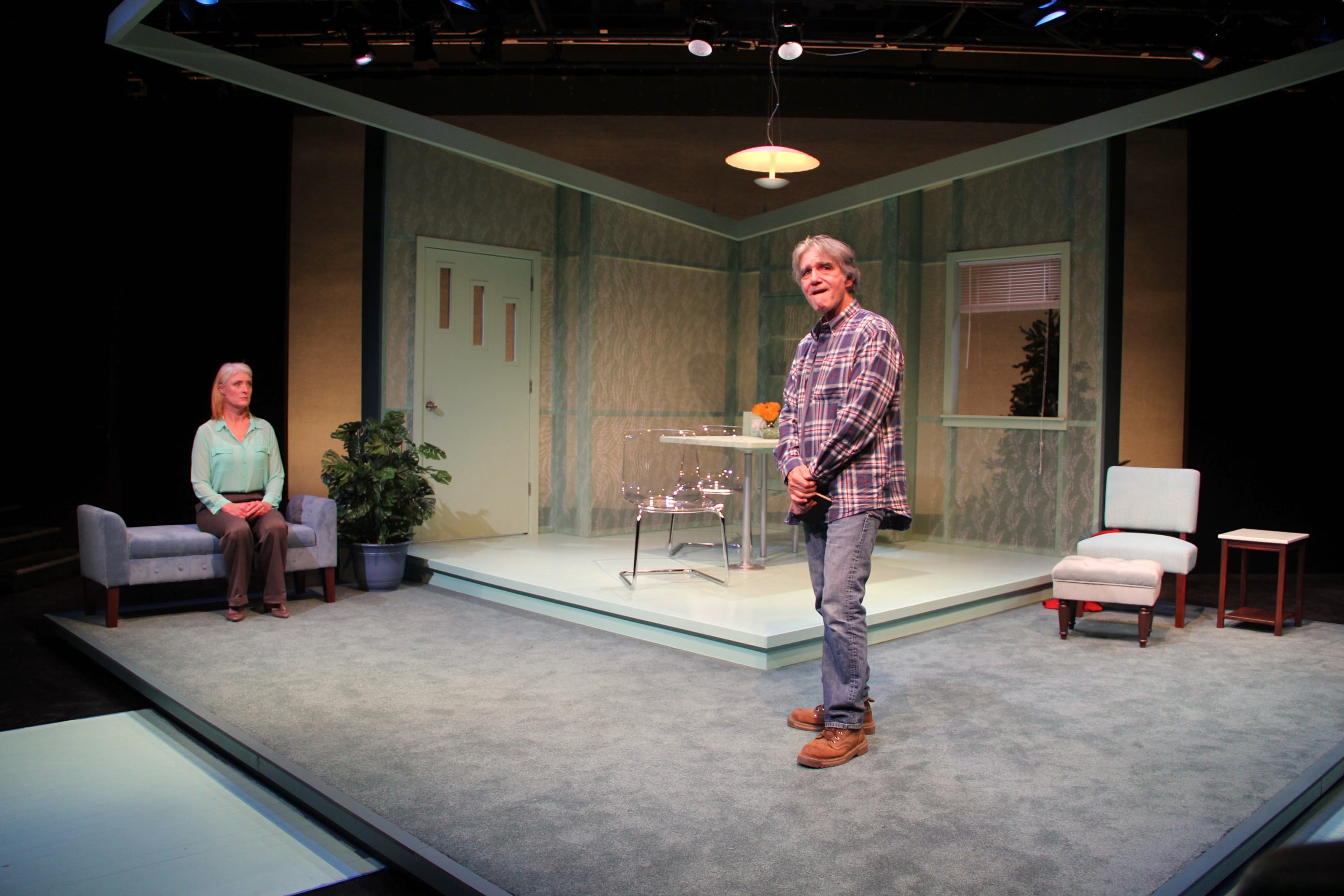(Above: Ruth Mandsager and Dan Pegoda, two of the actors in “Marjorie Prime” at the Oregon Contemporary Theatre.)
By Randi Bjornstad
After the first weekend of “Marjorie Prime” performances — the play runs through Nov. 25 at the Oregon Contemporary Theatre — director Willow Jade Norton couldn’t be happier.
“I’ve been overjoyed by what members of the audience say about the play,” Norton said. “One gentleman came up on opening night during the gala after the performance, and he said he’d never been to a gala where afterward, people only wanted to talk about the play.”
She’s heard that a lot since, and she thinks it’s because the play “makes you work a bit.”
At the same time, she said, “It reminds people of their own lives and relationships, even though it takes place in the not-so-distant future.”

The cast of “Marjorie Prime” at Oregon Contemporary Theatre consists of Dan Pegoda, Ruth Mandsager, Elen Chace and Scott Machado
“Marjorie Prime” is not sci fi in the way-out-there sense, but it does incorporate artificial intelligence in an exploration of the memory loss that can occur in later life and how it affects the people who experience it as well as their closest relatives and friends.
Written by the highly touted Jordan Harrison, the play was a finalist for the Pulitzer Prize in drama in 2015 and turned into a film by director Michael Almeryda and presented at the Sundance Film Festival earlier this year. Harrison’s long list of accomplishments includes having been a writer and producer for original series of Netflix’s “Orange is the New Black.”
The story of “Marjorie Prime” centers around the title character, who is 85 years old and losing her grasp on memory and reality. But in the future time when the play takes place, artificial intelligence allows people in Marjorie’s situation to choose a technological companion to help them remind themselves of their past lives.
When it’s time for Marjorie to make her choice, she picks a three-dimensional, walking, talking hologram of her husband, Walter, as he was at age 30.
“He is handsome and well-dressed, just the way he was in the early days of their relationship, and he reminds her of the beautiful moments they shared together,” Norton said. “When I first read the play, I could see all the potential for the dark side of relationships in a future reality like that. But then I realized that underneath it all, it was a story about love — and that even an artificial intelligence potentially can help us value what is human — and I was hooked.”
In preparation for directing the play, Norton did a lot of reading and thinking about Harrison’s motives for writing it.
“His own grandmother had Alzheimer’s disease, so he was experiencing that challenge, and he thought, what if artificial intelligence could perform a useful function in that way,” she said. “Apparently he was reading ‘The Most Human Human’ at the time.”
That’s a book by author Brian Christian about his participation in a contest called The Turing Test that pits human and computer contestants hidden behind a screen to test how closely computers are coming to approximating human thought and emotion.
A prize is given to the computer that fools the panel of judges most thoroughly in terms of its ability to be perceived as human and another to whomever — computer or human — they select as the “most human human” among the contestants.
One of Norton’s challenges as the director of “Marjorie Prime” was to how to blend the concept of the future of artificial intelligence with the present reality of real people and places.
“I think the playwright wanted to focus on the better part of humanity — how people cope with loss and still maintain their ability to love and live life as well as they can,” she said. “So I looked for the humor in the relationships at the same time that the darker aspects were there just as part of what makes people human.”
The play has only four parts, consisting of OCT veterans Elen Chace, Dan Pegoda and Ruth Mandsager, with Scott Machado making his first appearance on the OCT stage.
“They are all really great,” Norton said. “They were all game to go on this somewhat strange journey with me, and there were a couple of instances in the play that a couple of the actors had actually experienced in their own lives, which made it even stronger. I am so pleased with the way it has turned out.”
Along with director Norton, the artistic team includes scenic designer Jeffery Cook and sound designer Gabe Carlin, with Margo Glaser in charge of props, Heather Kidd as costume designer and Michael A. Peterson on lighting design. The production stage manager is Jennifer Sandgathe.
Marjorie Prime
When: 7:30 p.m. on Nov. 9-11, 16-18 and 24-25; and 2 p.m. on Nov. 12 and 19 with a “talk-back” after the matinee shows
Where: Oregon Contemporary Theatre, 194 W. Broadway in downtown Eugene
Tickets: $20-32; $15 for student with valid ID, available at the box office, 541-465-1506, or online at octheatre.org/












